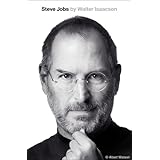Excerpt. © Reprinted by permission. All rights reserved.
Excerpt 1
His celebrity was reflected in a products he created. Just as a core of Apple’s philosophy, from a strange Macintosh in 1984 to a iPad a epoch later, was a end-to-end formation of hardware and software, so too was it a box with Steve Jobs: His passions, perfectionism, demons, desires, artistry, devilry, and mania for control were integrally connected to his proceed to business and a products that resulted.
The one margin speculation that ties together Jobs’s celebrity and products starts with his many distinct trait: his intensity. His silences could be as withering as his rants; he had taught himself to glance though blinking. Sometimes this energy was charming, in a geeky way, such as when he was explaining a deepness of Bob Dylan’s song or since whatever product he was phenomenon during that impulse was a many extraordinary thing that Apple had ever made. At other times it could be terrifying, such as when he was fulminating about Google or Microsoft ripping off Apple.
This energy speedy a binary perspective of a world. Colleagues referred to a hero/shithead dichotomy. You were possibly one or a other, infrequently on a same day. The same was loyal of products, ideas, even food: Something was possibly “the best thing ever,” or it was shitty, brain-dead, inedible. As a result, any viewed smirch could set off a rant. The finish on a square of metal, a bend of a conduct of a screw, a shade of blue on a box, a intuitiveness of a navigation screen—he would announce them to “completely suck” until that impulse when he astonishing conspicuous them “absolutel y perfect.” He suspicion of himself as an artist, that he was, and he indulged in a spirit of one.
His query for soundness led to his constraint for Apple to have end-to-end control of any product that it made. He got hives, or worse, when considering good Apple program using on another company’s crappy hardware, and he further was allergic to a suspicion of unapproved apps or ease polluting a soundness of an Apple device. This ability to confederate hardware and program and ease into one one complement enabled him to levy simplicity. The astronomer Johannes Kepler announced that “nature loves morality and unity.” So did Steve Jobs.
Excerpt 2
For Jobs, faith in an integrated proceed was a matter of righteousness. “We do these things not since we are control freaks,” he explained. “We do them since we wish to make good products, since we caring about a user, and since we like to tak e shortcoming for a whole knowledge rather than spin out a crap that other people make.” He also believed he was doing people a service: “They’re bustling doing whatever they do best, and they wish us to do what we do best. Their lives are crowded; they have other things to do than consider about how to confederate their computers and devices.”
This proceed infrequently went opposite Apple’s short-term business interests. But in a universe filled with junky devices, complicated blunder messages, and irritating interfaces, it led to startling products noted by pleasant user experiences. Using an Apple product could be as high as walking in one of a Zen gardens of Kyoto that Jobs loved, and conjunction knowledge was total by worshipping during a tabernacle of honesty or by vouchsafing a thousand flowers bloom. Sometimes it’s good to be in a hands of a control freak.
Jobs’s energy was also clear in his ability to focus. He would s et priorities, aim his laser courtesy on them, and filter out distractions. If something intent him—the user interface for a strange Macintosh, a pattern of a iPod and iPhone, removing song companies into a iTunes Store—he was relentless. But if he did not wish to understanding with something—a authorised annoyance, a business issue, his cancer diagnosis, a family tug—he would intentionally omit it. That concentration authorised him to contend no. He got Apple behind on lane by slicing all solely a few core products. He done inclination easier by expelling buttons, program easier by expelling features, and interfaces easier by expelling options.
He attributed his ability to concentration and his adore of morality to his Zen training. It honed his appreciation for intuition, showed him how to filter out anything that was distracting or unnecessary, and nurtured in him an cultured formed on minimalism.
Unfortunately his Zen training never utterly constructed in him a Zen-like ease or middle serenity, and that too is partial of his legacy. He was mostly firmly coiled and impatient, traits he done no bid to hide. Most people have a regulator between their mind and mouth that modulates their cruel sentiments and spikiest impulses. Not Jobs. He done a indicate of being brutally honest. “My pursuit is to contend when something sucks rather than sweeten it,” he said. This done him charismatic and inspiring, nonetheless also, to use a technical term, an asshole during times.
Andy Hertzfeld once told me, “The one doubt I’d truly adore Steve to answer is, ‘Why are we infrequently so mean?’” Even his family members wondered either he simply lacked a filter that restrains people from venting their wounding thoughts or willfully bypassed it. Jobs claimed it was a former. “This is who we am, and we can’t pattern me to be someone I’m not,” he replied when we aske d him a question. But we consider he indeed could have tranquil himself, if he had wanted. When he harm people, it was not since he was lacking in romantic awareness. Quite a contrary: He could distance people up, know their middle thoughts, and know how to describe to them, inveigle them, or harm them during will.
The nasty corner to his celebrity was not necessary. It hindered him some-more than it helped him. But it did, during times, offer a purpose. Polite and fluffy leaders, who take caring to equivocate bruising others, are generally not as effective during forcing change. Dozens of a colleagues whom Jobs many abused finished their litany of fear stories by observant that he got them to do things they never dreamed possible.
Excerpt 3
The tale of Steve Jobs is a Silicon Valley origination parable command large: rising a startup in his parents’ garage and building it into a world’s many profitable company. He didn’t invent many thin gs outright, though he was a master during putting together ideas, art, and record in ways that invented a future. He designed a Mac after appreciating a energy of graphical interfaces in a proceed that Xerox was incompetent to do, and he total a iPod after rapacious a fun of carrying a thousand songs in your slot in a proceed that Sony, that had all a resources and heritage, never could accomplish. Some leaders lift innovations by being good during a large picture. Others do so by mastering details. Jobs did both, relentlessly. As a outcome he launched a array of products over 3 decades that remade whole industries.
Was he smart? No, not exceptionally. Instead, he was a genius. His talented leaps were instinctive, unexpected, and during times magical. He was, indeed, an instance of what a mathematician Mark Kac called a wizard genius, someone whose insights come out of a blue and need premonition some-more than small mental estimate power. Like a pathfinder, he could catch information, spot a winds, and clarity what lay ahead.
Steve Jobs so became a biggest business executive of a era, a one many certain to be remembered a century from now. History will place him in a pantheon right subsequent to Edison and Ford. More than anyone else of his time, he done products that were totally innovative, mixing a energy of communication and processors. With a ferocity that could make operative with him as unsettling as it was inspiring, he also built a world’s many artistic company. And he was means to interpose into a DNA a pattern sensibilities, perfectionism, and imagination that make it expected to be, even decades from now, a association that thrives best during a intersection of dexterity and technology.
Excerpt 4
The disproportion that Jony has made, not usually during Apple though in a world, is huge. He is a wickedly intelligent chairman in all ways. He understands business concepts, selling concepts. He picks thin gs adult usually like that, click. He understands what we do during a core improved than anyone. If we had a devout partner during Apple, it’s Jony. Jony and we consider adult many of a products together and afterwards lift others in and say, “Hey, what do we consider about this?” He gets a large pattern as good as a many microscopic sum about any product. And he understands that Apple is a product company. He’s not usually a designer. That’s since he works directly for me. He has some-more operational energy than anyone else during Apple solely me. There’s no one who can tell him what to do, or to boundary out. That’s a proceed we set it up.
Excerpt 5
When Jobs collected his tip government for a pep speak usually after he became iCEO in Sep 1997, sitting in a assembly was a supportive and ardent thirty-year-old Brit who was conduct of a company’s pattern team. Jonathan Ive, famous to all as Jony, was formulatio n to quit. He was ill of a company’s concentration on distinction maximization rather than product design. Jobs’s speak led him to reconsider. “I remember really clearly Steve announcing that a idea is not usually to make income though to make good products,” Ive recalled. “The decisions we make formed on that truth are essentially opposite from a ones we had been origination during Apple.” Ive and Jobs would shortly forge a bond that would lead to a biggest industrial pattern partnership of their era.
Ive grew adult in Chingford, a city on a northeast corner of London. His father was a silversmith who taught during a internal college. “He’s ...










